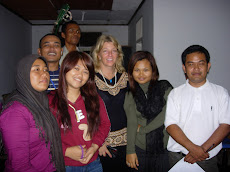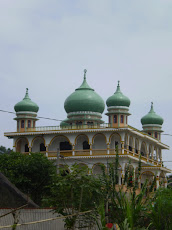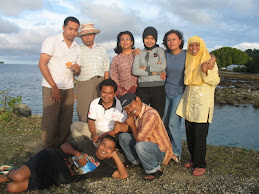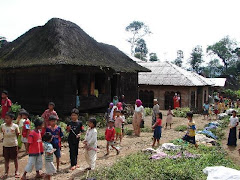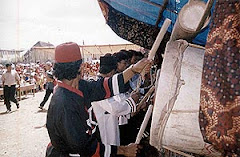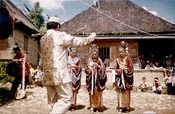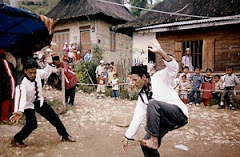Fascinating Sibanggor Julu
Nazif Jaafar Tanjung
Klang, Selangor Darul Ehsan Malaysia
There have been several short-term contacts made between my father and his relatives from Sumatra before I was interested in the family history. These contacts were initiated when a woman in her late thirties, (according to mother) covered in a fashionable ‘tudung’ or headscarf, heavy made-up face, thick eyeliner and small built, showed up at the house introducing herself as Betty Julia Tanjung.
That surname opened doors and immediately she was accepted as family. She came with her parents and her family. The husband is Malaysian. Her parents were Indonesian.
I don’t know much about the meeting but my mother related the historic event to me. At that moment in time, I was on the opposite side of the Peninsular. As a Business Manager of a commercial bank, I was posted in Kuala Terengganu, which was about 550km away from home in Klang.
However, I do remember my mother telling me that Betty Julia and her parents were from Medan, the capital of North Sumatra Province, Indonesia. Thus, they were city folks like us. Wealthy and healthy and unlike the stories I gathered about hardship and living in the villages.My mother related stories about my Indonesian relatives to me. Names were bandied about that sounded very similar to ours. As an example, my paternal grandfather, Jamaluddin Tanjung, had a brother, Jalaluddin Tanjung, who came over to Malaysia with his family in the early twentieth century, and returned to Indonesia before the World War 1 began.

This revelation was indeed another proof that my cousin, Nasir Tanjung was a close relation to my family. Jalaluddin is Nasir Tanjung’s grandfather. And Jalaluddin had a brother, who is Betty Julia’s grandfather.
Betty’s parents stayed in my parent’s house for three weeks. Thus, allowing myself the opportunity to meet them over a weekend in Klang. Betty Julia’s parents were as short as she was. Her father, Baharuddin Tanjung, was about 5’5” tall and was medium built. Dark skinned like my own father. The face had similar features to my father too. Wide square jaws anchoring a square face. Broad foreheads with receding hairlines. Bushy eyebrows, wide set eyes that were piercingly sharp. Noses with flared nostrils were another trademark of the family. However, the Malaysian side of the family seemed to be slightly bigger in size.
Her mother is about the same height as her husband. But she was fair skinned and her size was certainly larger. Betty Julia’s features had come from her mother. The same almond eyes, long lashes (it could be the mascara), smooth facial skin, plucked eyebrows, full lips and a pointed chin. Both were extroverts and never lost for words.
Although, Kuala Terengganu was a distance away, I enjoyed the drive back to Klang as it took me past white sandy beaches in Terengganu, rows upon rows of neatly planted oil palm trees, twisty roads up and down mountains in the Banjaran Titiwangsa and into the urban spectacle of the Klang Valley. All in, the journey would take about 7 hours of leisurely driving. If I had to rush, I could shorten it to about 5 hours.
After the first contact, my parents were overwhelmed with relatives and people who claimed to be relatives coming over to the house. Many were already in Malaysia earning a living as traders or assistants to traders. Some were students in one of the many private institutions. Invariably there are some who come over as weekend students and then worked during the week. But they all had something in common. They were all Mandailings.
Meetings and ‘kenduri’ or feasts were held to forge a bond between the Indonesian and the Malaysian Mandailings. The meetings were just a means of friendly get-togethers and a forum for bits and pieces of news from the Indonesian Homeland to be passed on. These meetings were interesting because sometimes a relative would come out of the woodwork and stories of the past would be told. Tales were told of our ancestors’ bravery crossing the Straits of Melaka and forging a new life here in Malaysia.
To digress a little, I don’t remember anyone ever mentioning my father’s youngest sister. My aunty had (and still does have) well-trained security personnel chasing away any uninvited visitors. This may seem cruel to you, but it is necessary for my auntie’s family. Numerous attempts have been made to rob and ransack their house (and once the robbers were successful).
One day after the numerous meetings, Betty Julia’s parents invited my parents over to Medan. They even discussed about a possible trip to the ancestral homeland, Mandailing Natal. Would I one day make my way to the ancestral homeland? Unlikely, I thought then. After all, a big hurdle was my passport or lack of it. My international passport had gone missing after The Big Flood of 1995 in Taman Sri Muda, Shah Alam. I had just started work as an Executive Officer in a Bank based in Kuala Lumpur. Stayed with a friend because it was closer to my office.
It was December 1995 and the rainy season had begun. My father had presented to me a new Alfa Romeo 155 that my elder brother upgraded. It was seriously cool looking. On the night of my birthday, I invited my housemates out to dinner. We went out in one of my housemate’s car. Thus, my Alfa was left behind. It was raining then. By the time we were made our way back, the route to our neighborhood was inundated with rising water. There were people gathered on a bridge stopping all traffic through.
We didn’t realize at that moment how serious the situation was. There have been floods before in our area but always the water level would be up to ankle high. This time it went to shoulder height. As my room was on the ground floor, strong currents carried all my belongings away. We were stranded in the house for more than 24 hours without electricity and clean water. Oh yes, we stupidly forced our way back to the house.
I never did report the loss until I had to much later. So, I believed, that without a police report, the Malaysian Immigration Department wouldn’t entertain my application for a new passport. The stalemate carried on until one day when I knew I had to make my journey to Mandailing.
Without my passport, I was not able to follow my parents when they decided to accept an invitation from Betty Julia’s parents to visit them in Medan. I was disappointed but didn’t think much of it then. After all, I was not emotionally attached to my relatives in Indonesia…back then. How things change after your feelings come into play. But I will get to that later on.
My parents made the journey to Medan together with several other relatives including my foster mother, the late Fahiyah Yahya. Fahiyah, who nurtured me in my younger years, was given the opportunity by my parents to visit her father’s homeland. Her late father is my paternal grandfather’s nephew. Thus, we are closely related. This is an important fact for me to remember because later, the relationship will prove to be vital in bringing the families across the Straits of Melaka even closer.
As I was not a participant to the historic journey to Sumatera, I will only be able to relate what had taken place there from stories I gathered from my parents. From what I was told, the trip was a resounding success. It was beautifully captured in pictures taken by many. My father was especially emotional when he related his first time seeing the hills and mountains of Mandailing. Although they began their visit from Medan, it was the journey to Mandailing that took the lion’s share of the stories told.
Medan was a traffic nightmare according to my parents. I suppose after going though the roads in Medan, what we normally experience in the Klang Valley would seem tame by comparison. They said drivers had no manners. And that was not the worse part of the trip.
Without any knowledge before hand of the Medan cityscape, I could not picture how the grid road system works there. I knew the former colonists, the Dutch, had laid down their rules and system. Most of the infrastructure existing also dates back to the pre-independence days of 1945. Some are no longer suitable for the modern days.
My parents had mentioned about ‘gangs’ or alleys. These alleys are extremely narrow and certainly would not be allowed to exist in the Klang Valley. Only about 2 metres wide with the boundaries demarcated by brick fencing or walls. This made it so forbidding to outsiders. In one of these alleys live Betty Julia’s parents. Father enjoyed the stay in Medan. It could have been the reception he received by the many relatives staying in Medan.
Then, the real reason for the journey started. Two vehicles were utilized to ferry the group of 16 people around. Half were Malaysians and the balance was Indonesian. All were related to the Tanjung clan. They made their way to their first stop, Parapat, in Toba Samosir Povince.Along the way, they moved through several large towns. Lubukpakam, Seirampah, Tebingtinggi, Pematangsiantar. Each town had a distinct personality. The group particularly enjoyed Tebingtinggi due to its clean environment relative to Medan. Then it was onwards to Parapat.
Fantastic! That was the verdict from everyone. Parapat was a town by the shores of Lake Toba or “Danau Toba”. The views, as my father would put it, was just like in Lake Geneva, Switzerland. To me, the pictures managed to capture some of the essence of it being a lovely place with the weather being conducive to flowering plants. The group stayed over for the night in a hotel by the lakeshore.Amazing stories about the roads crossing the Barisan range had me wondering. If the roads were as bad as what was claimed by my parents, why doesn’t the Indonesian government allocate a bigger budget towards road maintenance? Strange that people still want to travel in that region. Strange indeed. I pictured narrow roads clinging to sheer cliff-like mountainsides with deep gorges on the other side waiting for wary travelers to make a mistake.
Then the stories were more about the incredible scenery at all the spots where the group had their break. There was Balige, at the south end of Danau Toba and Tarutung in the flat plains. The journey then took a sweat-inducing segment. The name, Sipirok, was mentioned in hushed tones. Even the mere mention, Sipirok, conjured up images of an uncontrolled environment.With a tale as incredible as a place called Sipirok, I was hooked at the awe-inspiring journey. The way my parents relayed the story made it seem as if the road to Sipirok was the pinnacle of all the bad roads found in Sumatra North. Their hand gestures indicated a steep descent down a slope and then sharply climbing up again. When father mentioned that some of the group wanted to walk down the slope and up again instead of staying in their vehicles, I knew it must have been frightening.
After surviving Sipirok, the group continued their journey to Padangsidempuan and then to Panyabungan. They stayed in a hotel in Panyabungan for the night. Panyabungan is the biggest town closest to Sibanggor Julu. Nothing much was mentioned by my parents about Panyabungan.After a night’s rest, the refreshed group then finally pushed for the final leg to their homeland. If the roads from Medan to Panyabungan had been said to be narrow, the road to Sibanggor was narrower. It was as narrow as the vehicles the groups were in. I imagined roads that had blind corners, sharp bends, steep inclines and even some livestock roaming on it. Reality was different. When I finally made it there, it was worse.
Finally, Sibanggor Julu was reached after a journey that my mother described, “as if we were traveling back in time. A place that modernity had not reached and influenced”. Somehow this statement made the place almost like the Lost World to me.
Images of houses that were made of wood and palm frond rooftops flashed in my mind. Paths of battened red earth trailed from house to house and up the hill slopes and into the paddy fields. Rivers babbled with ice cold clear water on their way downhill. Trees bursting with flowers and fruits entangled with vines that seem to strangle their hosts.
Children running barefoot and with smudged faces playing games in between tall trees. Elder folks wrinkled and shriveled bent double. Strong, short and sturdy were the men. The women were always carrying pails or bundles of cloth on their heads.Now, I know mother must have exaggerated the description to spice up her stories. But back then with no knowledge of the homeland, I relied on her tales of Sibanggor Julu.
A feast was given in honour of the visit. The village people treated my parents and the other guests like royalty. Everyone turned up to see the visitors from across the Straits of Melaka. Happy occasions are rare and if one should come around, they will certainly enjoy it. The beautiful ancient culture of the Mandailings was put on display. From the pictures they took, I saw the faces of the family that I now have in Indonesia. Their faces reflect their passion. Their eyes reflect their souls.
How I longed to be part of this family, this culture, and this history. An adventure will take place when I am able to break free from my mental grip of insecurity. To travel alone? If it came to that, I would have done so.
Tobe Continued...........

